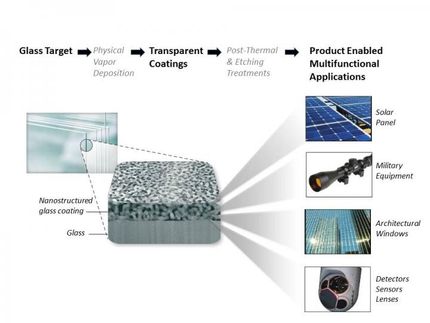In probing mysteries of glass, researchers find a key to toughness
In Nature Communications, a Yale University team and collaborators propose a way of predicting whether a given glass will be brittle or ductile — a desirable property typically associated with metals like steel or aluminum — and assert that any glass could have either quality.
"Most of us think of glasses as brittle, but our finding shows that any glass can be made ductile or brittle," said Jan Schroers, a professor of mechanical engineering and materials science at Yale, who led the research with Golden Kumar, a professor at Texas Tech University. "We identified a special temperature that tells you whether you form a ductile or brittle glass."
The key to forming a ductile glass, they said, is cooling it fast. Exactly how fast depends on the nature of the specific glass.
Focusing on a new group of glasses known as bulk metallic glasses (BMGs) — metal alloys, or blends, that can be extremely pliable yet also as strong as steel — researchers studied the effect of a so-called critical fictive temperature (CFT) on the glasses' mechanical properties at room temperature.
When forming from liquid, there is a temperature at which glass becomes too viscous for reconfiguration and freezes. This temperature is called the glass transition temperature. Based on experiments with three representative bulk metallic glasses, the researchers said there is also, for each distinct alloy, a critical temperature that determines the brittleness or plasticity of the glass. This is the CFT.
Researchers said it's possible to categorize glasses in two groups — those that will be brittle because in liquid form their CFT is above the glass transition temperature, and those that will be ductile, because in liquid form their CFT is below the glass transition temperature.
They previously thought a liquid's chemical composition alone would determine whether a glass would be brittle or ductile.
"That's not the case," Schroers said. "We can make any glass theoretically ductile or brittle. And it is the critical fictive temperature which determines how experimentally difficult it is to make a ductile glass. That is the major contribution of this work."
The finding applies theoretically to all glasses, not metallic glasses only, he said.
"A glass can have completely different properties depending on the rate at which you cool it," Schroers said. "If you cool it fast, it is very ductile, and if you cool it slow it¹s very brittle. We anticipate that our finding will contribute to the design of ductile glasses, and in general contribute to a deeper understanding of glass formation."
Most read news
Other news from the department science

Get the chemical industry in your inbox
By submitting this form you agree that LUMITOS AG will send you the newsletter(s) selected above by email. Your data will not be passed on to third parties. Your data will be stored and processed in accordance with our data protection regulations. LUMITOS may contact you by email for the purpose of advertising or market and opinion surveys. You can revoke your consent at any time without giving reasons to LUMITOS AG, Ernst-Augustin-Str. 2, 12489 Berlin, Germany or by e-mail at revoke@lumitos.com with effect for the future. In addition, each email contains a link to unsubscribe from the corresponding newsletter.




























































